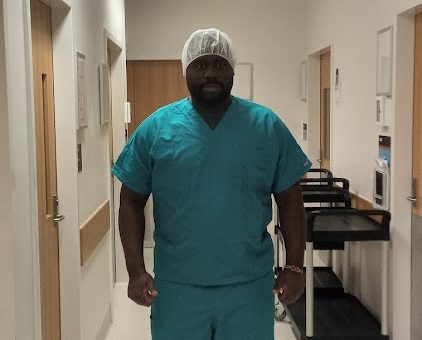Jeff Ojwach reflects on his PIPS experience “Down Under”

Jeff Ojwach, a 3rd year PhD student based at the School of Biological Sciences, University of East Anglia undertook his PIPS at the Clem Jones Centre for Neurobiology and Stem Cell Research on the Gold Coast, Australia. The overall aim of his placement was to learn and be trained on the comprehensive cell transplantation therapy to treat spinal cord injury. It also involved working on established protocols by generating three-dimensional (3D) cellular nerve bridges with the objective of learning cell transplantation therapy to treat spinal cord injury. Jeff was also trained to use 3D design software to generate a range of designs of nerve bridges which were produced using 3D bioprinters to test which ones lead to stable nerve bridges.
Jeff was excited to learn a new niche in neurobiology and transplantation therapy where cellular nerve bridges, made from olfactory ensheathing cells (OECs) are transplanted into the spinal cord injury site, combined with long-term intensive rehabilitation. Jeff participated in patient interviews and lab tours as the new translation treatments were moving to the preclinical phase and plans were underway to progress to Phase I human clinical trial. Jeff also worked with BioSpine clinic on the Gold Coast, which is a digitally enabled rehabilitation technology for spinal cord injury (SCI) that combines the effect of multiple rehabilitation technologies and drug therapy. In this clinic Jeff used electrical stimulation of muscles, thought-control, virtual reality, cycling, and anti-anxiety drugs on patients with SCI and this partially helped to restore movement and sensation.
Jeff’s PIPS was a mix of lab-based research and doing rehabilitation programs with the Clem Jones industry partner, Making Strides at Burleigh Heads, a specialist rehabilitation centre for people living with spinal cord and peripheral nerve injuries respectively. In the lab, Jeff was trained to extract tissue cultures from mice olfactory ensheathing cells (MOECs) used as model organisms to develop the proof of concept. Jeff learned how to print nerve bridges of different dimensions and shapes using a range of 3D printers to test the limitations of current designs.
During the PIPS Jeff’s project generated a deeper understanding of the commercial provision of rehabilitation services for people living with spinal cord and peripheral nerve injuries. This knowledge of spinal cord rehabilitation services was used to suggest changes to design and delivery. Jeff also pitched the findings of his internship experiences by presenting at workshops, and seminars at Griffith University on the Gold Coast Campus. The placement also helped Jeff to establish new collaborative working relationships with other researchers at Griffith University and he is most grateful to Professor James St John for this opportunity.
Jeff’s motivation to undertake such an internship in Global Health was a result of years of playing both club and international rugby, where he suffered numerous and some life-threatening injuries. He had a cervical vertebrae injury in 2010 and lateral meniscus tear in 2015, an isolated posterior cruciate ligament (PCR) and a meniscal femoral ligament sprain in 2014 and all these have inspired his interest in rehabilitation research systems.
Jeff enjoyed the hospitality of the Australian people and visited iconic rugby facilities such as the Allianz, Suncorp, and the famous Melbourne Cricket Ground. He also travelled to Sydney, Melbourne, and Brisbane plus a memorable yacht cruise in the South Pacific.
Jeff advises future PIPS students to explore opportunities globally for exposure and capacity building. Jeff commented, “knowledge gained from neurobiology will aid sports science and it is conceivable that benefits will be realised in the near future.”
